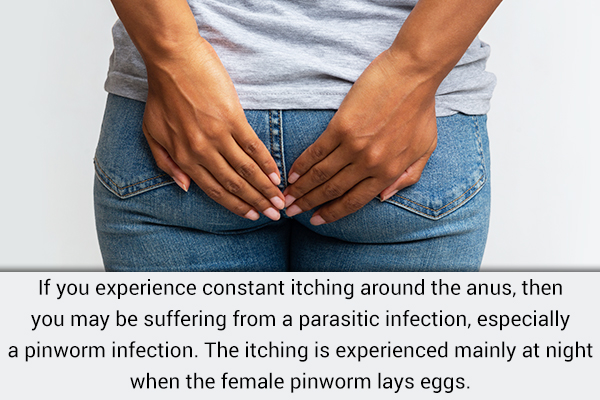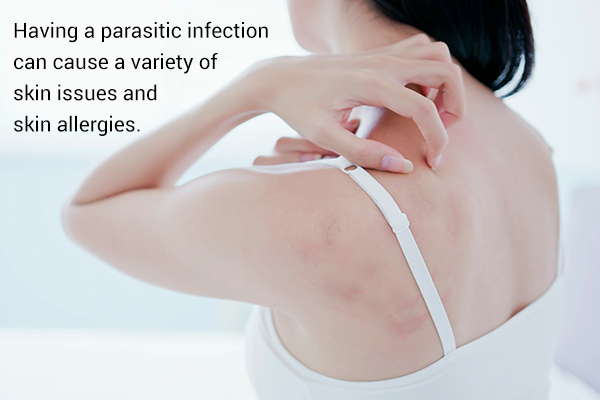In this article:
Having parasites in your body sounds like a scary thing to experience. Although extremely unpleasant, these parasitic infections in humans are very common.

These infections can get to you from anywhere, irrespective of geographical boundaries. They cause symptoms that affect the entire body and aren’t limited to only your digestive system.
Read on to know more about this topic!
What Are Parasites?
Parasites are microorganisms that require a host to support their living as they feed off them and live in the host’s body. In the case of humans, the body acts as the host where a vast variety of parasites can live. (1)
The parasites infest your body and feed off your nutrition. They survive on the food you eat or on your blood cells. They may also lay eggs inside or on your body that may cause:
- Itching
- Irritability
- Sleep troubles
Common parasites are tapeworms, (2) flukes, (3) hookworms, (4) and pinworms. (5)
Signs of a Parasitic Infection
Here are the top symptoms that may indicate a parasitic infection.
1. Digestive issues
When parasites live in your intestines, then they may cause an inflammatory response in your digestive system, (6) leading to:
- Constipation
- Gas
- Diarrhea
- Abdominal pain
- Bloating
- Nausea
- Burning sensation
2. Weakness
Parasitic worms that live in your intestine are mainly associated with causing weakness and fatigue. This is because the worms feed on the food you eat, depleting important nutrients required for proper energy production. (7)
Your body starts to feel weak when the vitamins, minerals, and other nutrients are not absorbed properly from the intestine due to the parasite infection. This leads to:
- Mental stress
- Physical exhaustion
- Lethargy
3. Itching

If you experience constant itching around the anus, then you may be suffering from a parasitic infection, especially a pinworm infection. The itching is experienced mainly at night when the female pinworm lays eggs. (8)
Scratching the area that itches may lead to bacterial infections as your skin barrier breaks. Since the itching occurs at night, you may also have:
- Insomnia
- Restlessness
- Fatigue
4. Anemia
Parasitic infections cause an iron deficiency in the body as these parasites take away iron from the food you eat. This may lead to iron-deficiency anemia. (9)(10)
5. Appetite gain
When you suffer from intestinal worms or parasitic infections, you may feel a sudden increase in your appetite. The notable issue is that even with this increased appetite, you undergo weight loss. This is a very common symptom of a tapeworm and pinworm infestation.
The appetite gain is due to the fact that the worm feeds on the food you eat, making you feel hungry and not fulfilled after a meal. (11)
6. Mental issues
Having a parasitic infection can cause:
- Depression
- Anxiety
- Hallucination
- Mood swings
- Restlessness
- Nervousness
This is because your gut is responsible for the production of neurotransmitters as part of a healthy enteric nervous system. Toxins produced by the parasite end up damaging the neurons and neurotransmitters, thus affecting your mental health. (12)
7. Abdominal pain
Parasitic infections commonly lead to abdominal pain. The parasites that live in the upper abdomen region cause irritation in the area, leading to abdominal pain. (13)
8. Skin problems

Having a parasitic infection can cause a variety of skin issues and skin allergies. These can be a result of the presence of a specific stage of the parasite’s life cycle in the body and not compulsorily due to parasitosis in the host. (14)
The allergy symptoms may include:
- Rashes
- Eczema
- Hives
- Swelling
- Lesion
- Rosacea
9. Hair problems
The toxins produced by parasites in your body can cause dry and brittle hair, making them fall off easily, although more studies are needed on this topic. (15)
10. Joint pain
Parasites invade the tissues in your muscles and joints, leading to inflammation and consequently pain and irritation. Several human and animal studies have confirmed the role of parasitic infections in rheumatoid arthritis. (16)
Diagnosing Parasitic Infections
If you think you are experiencing one or more of the above-mentioned signs and symptoms, get yourself checked. Diagnostics tests that may help in discovering the infection include:

- Blood test – This is invasive as it includes drawing a blood sample for examination to detect the presence of the parasite inside the body.
- Fecal test – This is a noninvasive test where your stool sample is checked for parasites or their eggs and larvae.
- Tape test – A piece of tape is stuck around the anus and then taken off to be examined for the presence of pinworms. In some cases, these pinworms may be visible to the naked eye.
- Imaging – MRI or CT scans are done to look for any organ damage or injury that may have occurred due to a parasitic infestation.
Most-Asked Questions About Parasites
How do parasites survive inside the body?
Parasites survive on the food you eat or your blood as they live off your body. This may cause you to become weak and unable to gain weight due to a lack of nutrition. You may even suffer from anemia as the parasites feed on your red blood cells.
How can parasites be transmitted from one person to another?
It is very easy for parasitic infections to be passed on to someone healthy. This may happen if the infected person does not wash their hands regularly, especially after using the restroom, or doesn’t practice good hygiene.
Traveling can also let foreign parasites enter your body. (17)
What kind of diet can prevent parasitic infections?

To prevent parasitic infections, you should have a diet rich in fiber and vitamin C. Avoid eating simple carbohydrates such as refined foods.
Eat garlic, carrots, and beets as they are known to kill the parasites. Also, ensuring proper hydration is of extreme importance.
What are some regions with a high risk of parasitic infections?
People who live in rural areas or developing countries are more prone to parasitic infections than those who live in urban or developed areas. This is because of the higher risk of contamination of water and food in rural regions.
Places that may have poor sanitation or are unhygienic due to low maintenance are also more prone to these infections. (18) The parasite enters your body via penetrating your skin or entering your mouth once exposed to it.
Also, those with a poor immune system are more prone to parasitic infections irrespective of the area they’re living in. Pets at home can also be carriers of parasites. So, coming in close contact with them lead to an infestation.
Final Word
There are a lot of different types of parasites that can infect human bodies and live in our intestines. Sometimes they can go on living inside our bodies without any symptoms.
Parasites take nutrition from our bodies and can cause infections. Following closely on unexpected signs and symptoms of intestinal infection can be helpful in knowing if we have parasites living inside us.
If you experience such events, you should go for a medical checkup immediately.
- Was this article helpful?
- YES, THANKS!NOT REALLY


